US gains greater share of international student interest amid policy changes in competitor destinations
- The latest edition of IDP’s global Emerging Futures research finds that the US is now the most preferred study destination for international students, just ahead of Australia
- Canada is now the fourth most preferred destination after having been the first in previous surveys
- Prospective students research destinations’ job markets before they apply and are very influenced by career prospects when deciding where to apply
- More than half of students are aware of policies in destination countries that affect them, and many will change destinations if these policies are perceived as unwelcoming
For the first time in IDP Education’s Emerging Futures research, the US has emerged as the top-choice destination for surveyed international students, just ahead of Australia and the UK – and significantly ahead of Canada.
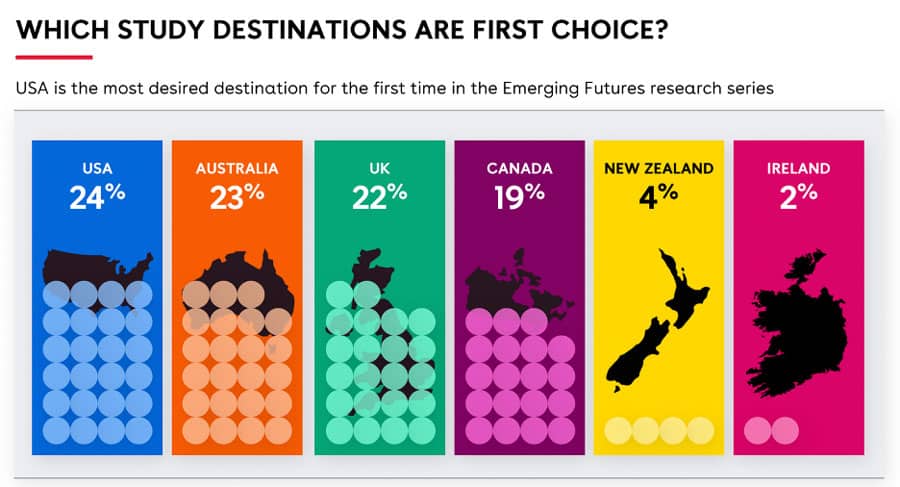
The Emerging Futures research programme was launched in March 2022 and now comprises five rounds of surveying of international students around the world. The latest survey went out in March 2024 to more than 11,500 prospective, applied (i.e., those who have submitted their study application), and current students from 117 countries.
The findings from the March 2024 wave suggest that more restrictive rules for international students now in effect in Australia, Canada, and the UK are weakening the competitive position of these destinations relative to the US. The IDP research found that many (54%) prospective and applied students are aware of the new policies in place in these countries and that a significant proportion (41%) of prospective students are reconsidering their study abroad plans as a result. More than a third of students (39%) said government policy updates have a high/very high impact on study abroad decisions.
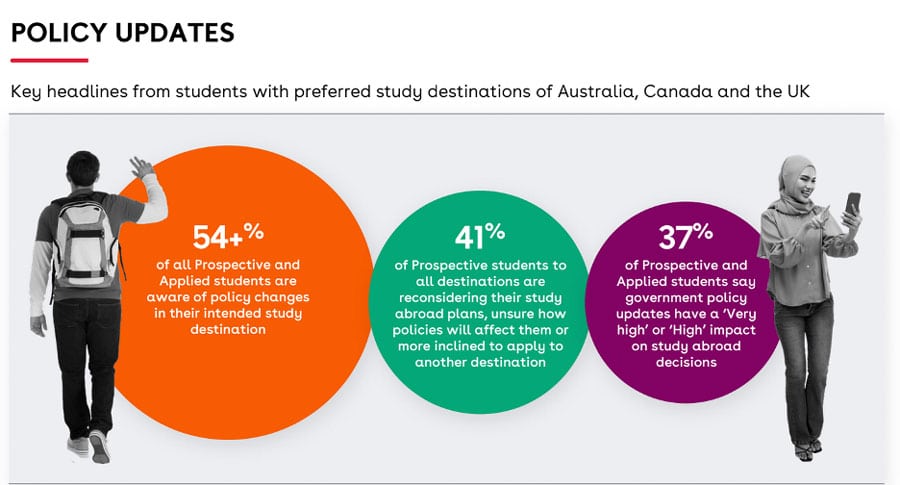
While the US has always had strict immigration settings for international students and while it rejected a record high number of student visa applications in 2023, its policies have not been a focus of media attention to the degree that policies in the other three of the “Big Four” destinations have been over the past few months. Its competitive advantages (especially quality of education) and disadvantages (especially perceived safety) have remained constant, unlike those of its top competitors.
Canada’s brand has been the most shaken by new policies
Canada has dropped from first (tied with Australia) to fourth place as a preferred study destination in tandem with its two-year cap on issuing new study permits and more restrictive rules affecting international students. Along with the cap, the Canadian government has removed work rights for the partners of international students unless they are accompanying graduate-level students – a move that echoes a similar shift in the UK this year.
As the following chart illustrates, Canada’s position has fallen off by six percentage points since August 2023 (and by eight points compared with earlier surveys). By contrast, the US has gained five points since last year.
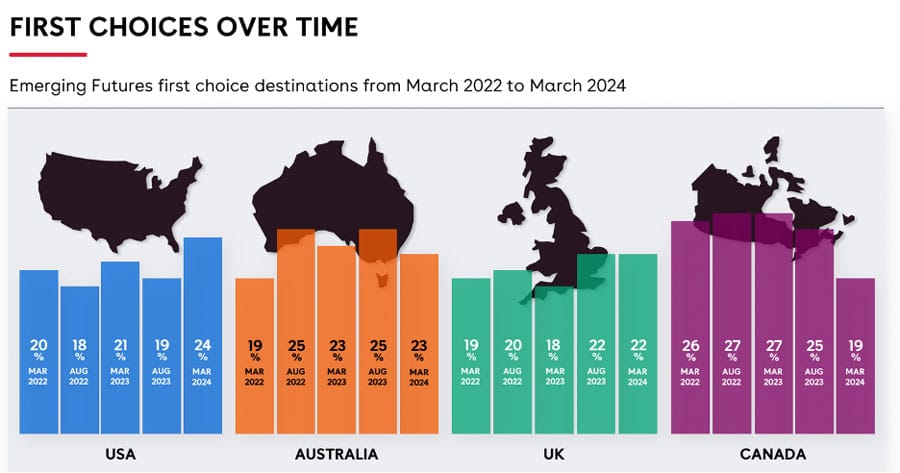
Simon Emmett, IDP Connect Chief Executive Officer, says:
“The growth in the US and emerging markets demonstrates that students remain committed to bringing their global study dreams to life but are sensitive to policy changes. The results are a reminder that governments in the UK, Australia and Canada need to provide clarity on international student policies in order to maintain the competitive advantage they have in this global industry.”
In 2024, the UK government stopped allowing family dependants to accompany international students (other than those accompanying research-oriented postgraduate students), and it is also currently reviewing the Graduate Route post-study work scheme (“to reduce opportunities for abuse”). Despite these developments, the UK retained its position as the second most preferred destination after the US in this wave of the Emerging Futures research. UK business schools, however, are reporting weaker non-EU enrolments this year, particularly at the postgraduate level.
Australia is in third place, descending from its previous number one spot (tied with Canada) and losing two percentage points since August 2023. Its reputation among international students is in some jeopardy as visa rejections have risen dramatically amidst tighter immigration settings (including a rigorous new “Genuine Student Test”).
US is benefitting from students rethinking previously preferred destinations
The US education brand is stable in contrast to so much upheaval and confusion around immigration settings in Australia, Canada, and the UK. Those competitor countries had prioritised a welcoming policy stance towards international students in 2023, and then quite abruptly reversed direction as migration levels climbed, supply of affordable housing declined, and media outlets seized on stories of students, agents, or institutions taking advantage of the immigration system. The US has thus not had to introduce a new source of competitive advantage to gain share of prospective student interest – it has only had to maintain the policies it already has in place.
Among students who are reconsidering where they will study, the US is claiming the most share (20%), but New Zealand, Ireland, and Germany are also attracting positive attention, as shown in the chart below.
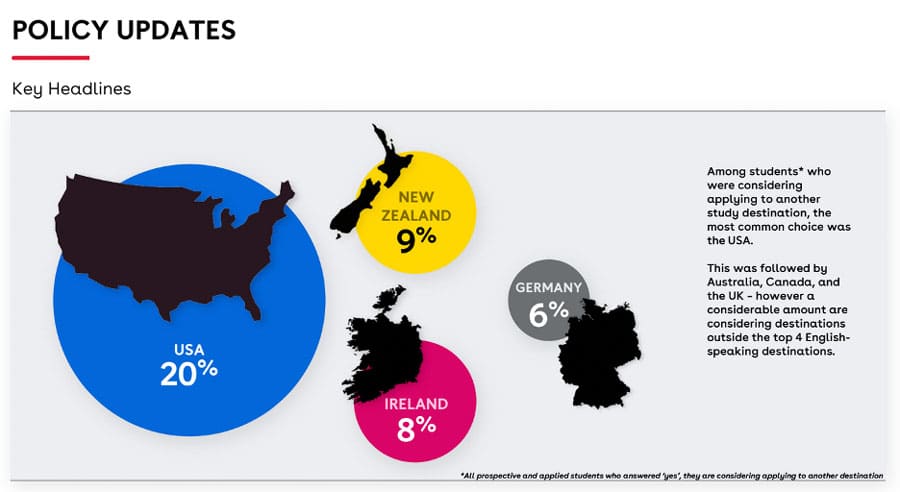
Opportunities to work/immigrate significantly impact choice of destination
IDP asked students about what influences them when choosing a programme of study. The greatest influence was looking for programmes aligned with “subject of interest,” but a large proportion (43% average across all countries) of students said they would choose a programme based on “earning potential after graduation” – rising to more than half of students in the major markets of China (55%) and the Philippines (57%).
In addition, IDP researchers point out that students (especially Bangladeshis and Filipinos) are highly influenced by whether there is demand for jobs in a destination country – much more so than by skills shortages in their own country. They note:
“This indicates students are looking at what opportunities are available after graduation even before they have started their international study programme. This links back to the important need to provide clarity on international student policies, such as post-study work, in order to maintain the competitive advantage they have in this global industry.”
Bangladeshi and Filipino students’ higher than average interest in jobs in a destination country also suggests that Bangladesh and the Philippines are markets in which demand is particularly linked to immigration-related policies affecting the ability of international students to work during/after their study programme.
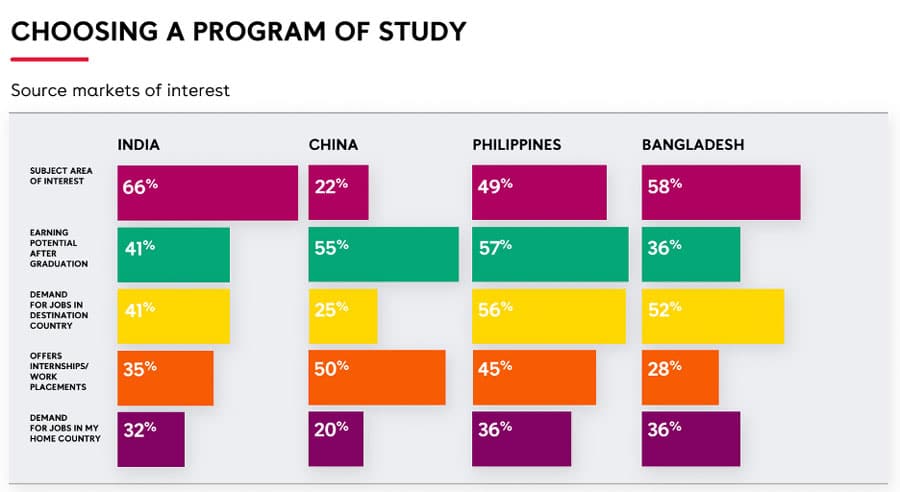
Students will go where they are welcome and able to pursue career goals
The IDP research underlines that most international students are well aware of what a destination does and does not offer them. They pay close attention to visa regulations and any policy changes that affect their ability to work and or emigrate to a host country. Study abroad is a massive investment, and naturally students will do all they can to make sure it pays off.
IDP researchers note that Australia, Canada, and the UK all lost ground in the most recent survey in terms of perceived quality of education. This is a significant finding given that all three countries now also have a weaker competitive offer in other areas such as dependants’ right to work (Canada and the UK) and ease of getting a visa (Australia and Canada).
The IDP research report concludes:
“International students are chasing lifechanging goals. They will adjust their destinations if they feel they will be more welcomed and receive a higher quality of education in another destination.”
For additional background, please see:
- ICEF Monitor Global Summit: A unique forum for thought leadership and discussion on both present-day trends and the future of international student mobility
- “How internationals students are deciding on graduate business schools”
- “The impact of immigration settings, affordability, and job opportunities on international students’ study abroad decisions”
















